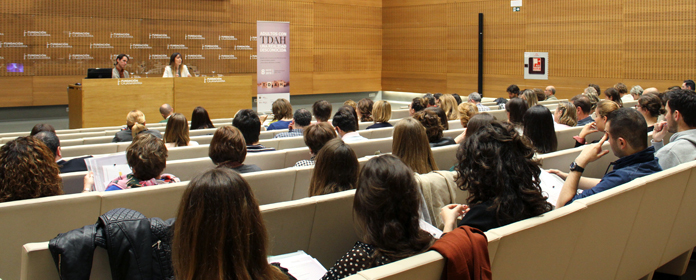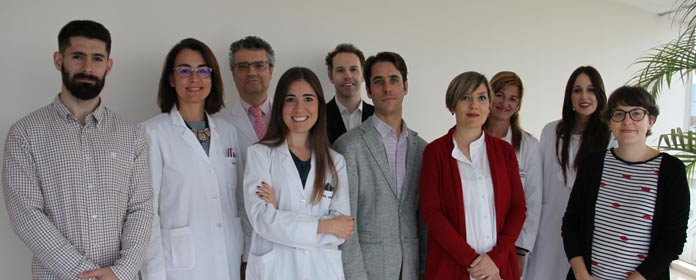"El TDAH afecta al 2,8% de los adultos y tiene consecuencias en su salud, trabajo y relaciones personales"
Una jornada de la Universidad de Navarra y la UNED de Pamplona enfatiza la importancia del diagnóstico para minimizar problemas asociados al trastorno

“El Trastorno por Déficit de Atención e Hiperactividad (TDAH) afecta al 2,8% de los adultos y tiene consecuencias relevantes en su salud, trabajo y relaciones personales”. Así lo ha afirmado Gonzalo Arrondo, investigador del Grupo ‘Mente-cerebro’ del Instituto Cultura y Sociedad (ICS) de la Universidad de Navarra, en el marco de la jornada ‘Adultos con TDAH, una realidad desconocida’. El experto ha coorganizado este encuentro con Raquel Artuch, profesora e investigadora de UNED Pamplona.
Según ha comentado Arrondo, si bien el 4% de los niños lo padece, “no es solo una cuestión que les afecta a ellos y que fundamentalmente influye en lo escolar; no desaparece con la mayoría de edad”. Así, ha enfatizado la importancia de la visibilidad del TDAH en adultos, ya que hay países donde la cifra de diagnóstico es solo del 1%.
Esta falta de diagnóstico -ha expresado- puede suponer problemas graves: “Si no sabes cómo eres no puedes tomar medidas para minimizar las consecuencias negativas”. Algunos de estos problemas asociados al trastorno pueden ser, de acuerdo con estudios, abuso de sustancias, depresión, ansiedad o trastornos alimentarios (bulimia, anorexia, obesidad...). “Si tienes TDAH y no llegas a todo, no cumples las expectativas, te puede generar ansiedad o depresión”, ha explicado.
Inquietud, impulsividad y conductas de riesgoEn la jornada también ha intervenido el psiquiatra Rafael Benito Moraga, quien ha subrayado que, en la vida adulta, el TDAH “conlleva un déficit en el rendimiento de funciones cerebrales básicas para una buena adaptación en gran parte de las áreas de la vida”.
Por un lado, ha expuesto que la dificultad para regular la atención puede provocar descuidos y olvidos en la vida personal y laboral, que pueden resultar molestas a cierta parte de su entorno. Incluso “despistes en la conducción que a veces tienen consecuencias graves”, ha añadido. Por otro lado, ha apostillado que “la inquietud y la impulsividad asociadas al trastorno favorecen la aparición de conductas de riesgo”, además de problemas derivados de no regular los propios actos, palabras o emociones.“El adulto con TDAH es inquieto, se distrae con mucha facilidad, olvida con frecuencia compromisos y le cuesta mantener el orden, la atención e iniciar tareas que exigen concentración”, ha descrito el psiquiatra.
Sin embargo, presentar estos rasgos no implica necesariamente padecer el trastorno. Tanto Arrondo como Benito han coincidido en que solamente hay que preocuparse si estos son “persistentes” y suponen “consecuencias negativas en la vida diaria”. Si se da este caso, aconsejan consultar al médico de referencia.
Además de ellos, han intervenido en el encuentro Egiarte Goikoetxea, orientadora del Instituto para adultos Félix Urabayen; Fernando Oscoz, orientador del centro integrado Cuatrovientos de formación profesional; Iñaki Lorea, psicólogo clínico de la Fundación Argibide y profesor de la Universidad Pública de Navarra; Azucena Díez, psiquiatra de la Clínica Universidad de Navarra; y Juan Cruz Ripoll, orientador en el Colegio Santa María la Real. Asimismo, personas adultas con TDAH y familiares han ofrecido su testimonio en una mesa redonda.
Esta jornada se ha enmarcado en el proyecto de investigación ‘Decisiones habituales: devaluación en la toma de decisiones en adultos con y sin TDAH’, que desarrolla el ICS con financiación del Ministerio de Economía y Empresa del Gobierno de España, y en el proyecto ‘Síntomas de TDAH en adultos: prevalencia en el sistema educativo de Navarra’, de UNED-Pamplona.




